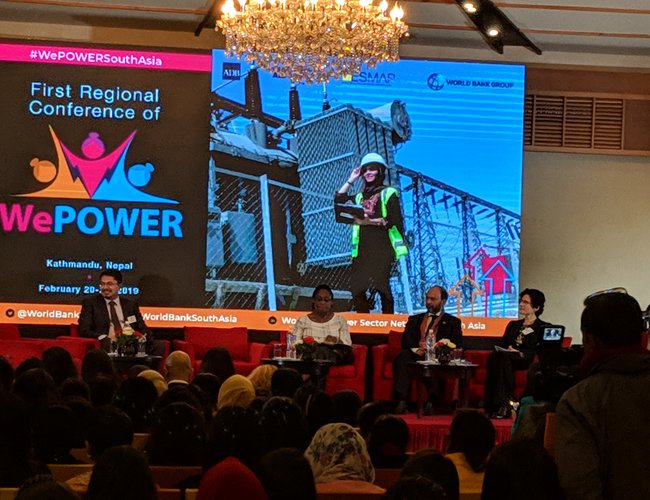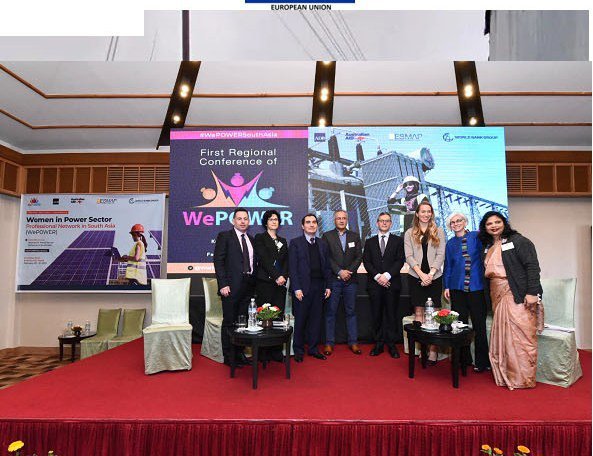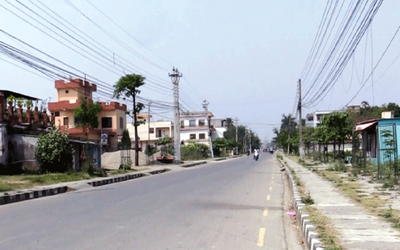
The first Regional Conference of WePOWER opened today with 150 attendees, including representatives of energy sector utilities and public agencies involved in projects, technical universities, women engineers, and students. The 2-day event is co-hosted by the World Bank Group and ADB.
The Asian Development Bank (ADB) is partnering in a new professional network launched today in Kathmandu to promote more female practitioners in South Asia’s energy and power sector.

Caption: ADB Team composed of Francesco Tornieri, Principal Social Development Specialist, SAOD -on the left- and CD/NRM Mukhtor Khamudkhanov -third to left- participated in the opening of the 1st Regional Conference of We-Power, with the WBG Team led by Caren Grown, Sr. Director, Gender Global Themes Department (on the right) and Maria Beatriz Orlando, Lead Social Development Specialist, South Asia Social Development Unit, WBG (second from the left).
The Women in Power Sector Professional Network in South Asia (WePOWER) aims to support participation of women in energy projects and institutions, as well as promote more women in science, technology, engineering, and mathematics education.
“WePOWER is closely aligned with ADB’s broader long-term commitment embodied in its long-term Strategy 2030 to remove constraints that women face in finding more and better jobs,” said ADB Principal Social Development Specialist Francesco Tornieri. “Although this applies to all sectors, we see the energy sector as one of the most challenging.”
Energy access and infrastructure development are critical elements in South Asia’s development. An ADB series of Gender Equality Diagnostic studies on the energy industry in South Asian countries has found that women’s skills and perspectives account for a small part of job and decision-making by energy sector agencies. Gender diversity in technical and senior managerial positions is also visibly lacking.
Moreover, an assessment conducted by the World Bank in 8 South Asian countries found very low female enrollment rates in engineering programs (ranging from 0.5% to 31%), low female staff representation in utilities (2% to 17%), and an even lower percentage of women in technical roles in utilities (0.5% to 6%). The studies identified the need for role models and family support, absence of basic facilities and transport, and presence of various forms of discrimination and harassment.
WePOWER is envisaged to become a vibrant and self-sustaining professional network backed by strategic partners that can provide technical and financial support. Its work program will focus on five strategic areas—education, recruitment, development, retention, and policy and analysis. WePOWER will provide capacity building support, networking, and mentorship for women engineers for career advancement, research to reform policies and practices, exposure to technology, recruiting opportunities, and access to information and conferences.
The World Bank Group has agreed to host the WePOWER Secretariat for an initial four years. A second Steering Committee meeting is planned to be held at ADB headquarters in November.
ADB is committed to achieving a prosperous, inclusive, resilient, and sustainable Asia and the Pacific, while sustaining its efforts to eradicate extreme poverty. Established in 1966, it is owned by 67 members—48 from the region.
- Nepal Army Held National Cyber Security Symposium
- Apr 26, 2024
- Nepal’s Investment Landscape Revitalize By Nine Ordinances: FNCCI President Dhakal
- Apr 26, 2024
- Weather Forecast: Partly Cloudy In Hilly region And Mainly Fair In Plain Areas
- Apr 26, 2024
- Nepal-China Aid Project Meeting Held In Lhasa
- Apr 25, 2024
- Ambassador Subedi Presented The Letter Of Credence To President Of Italy
- Apr 25, 2024
















